“But a Samaritan, as he journeyed, came to where he was, and when he saw him, he had compassion. He went to him and bound up his wounds, pouring on oil and wine. Then he set him on his own animal and brought him to an inn and took care of him.”
-- from the Parable of the Good Samaritan Luke 10:33-34
Why has there been such an astounding growth in the size, power, and influence of the federal government over the last 60 years?
In short, it’s the media. But not for the reasons you think. It’s not just the alphabet channels (ABC, CBS, NBC, CNN, HBO, NPR, etc.). It’s also talk radio, FOX news, You Tube and the rest of the Internet. I’m not trying to blame any liberal-big-government bias, though I believe it exists; I’m blaming the nationalization of local news, the coast-to-coast concern for small-town stories.
We have become increasingly aware of the state of the whole country and become personally involved in injustices unaddressed 2,000 miles away. We are no longer concerned merely with our local sphere of influence, with our local community. We are no longer concerned simply with the neighbors we encounter at the local store, or the school our kids attend, or the condition of the roads we happen to travel. We have become aware of the injustices visited upon Floridians, Minnesotans, Californians, Georgians (both the state and the country), Germans, Ethiopians, Iranians, etc. We have become disconcerted at the state of the US educational system in totality, not just our kid’s school. We have become incensed about bridges in Minnesota, and bridges to nowhere.
With problems this big, we feel like we need a big force to deal with it. We the people are too little to fix the national crises of poverty or texting while driving or teen pregnancy. Even if we have never met a homosexual couple wanting to get married, we are aware of the national struggle to redefine marriage in favor of those who feel left out. Even if our taxes seem to be about right and we don’t generally run into greedy rich people not doing their part, we are aware of a story here or there from across the country that reinforces the stereotype. Our opinions are shaped by the stories that captivate the news cycle and by experts that have conducted national studies on the topic. We begin to feel inadequate not only to deal with the problems, but even to form an opinion about them based on our own little, local, limited experience. We need a bigger, better equipped force.
The big force is inevitably the federal government.
But almost all problems are local problems. Gangs and ineffective schools, drugs and greedy rich people, blight and homelessness, are all problems that belong to a particular community. These communities are made up of families and individuals that all have the power to make a difference.
And don’t trust the “experts” more than other sources of wisdom in your life. In the words of Dennis Prager,
In much of the West, the well educated have been taught to believe that they can know nothing and that they can draw no independent conclusions about truth, unless they cite a study and experts have affirmed it. Studies show is to the modern secular college graduate what Scripture says is to the religious fundamentalist.
The difference is made locally. The difference is made by you, acting in the way you see best fit to the problem most accessible to you. The national news can make the task feel too daunting to undertake. But if we will wrest our lives from the false assurance that big brother has it handled, and if we will set our sites on making a difference where we live, we can be the change we all admit is needed.
“and when he saw him, he had compassion. He went to him…”
Our neighbors need us to see them, have compassion on them and go to them. No expert opinion or government decree can make up for a lack in neighborly good deeds.
